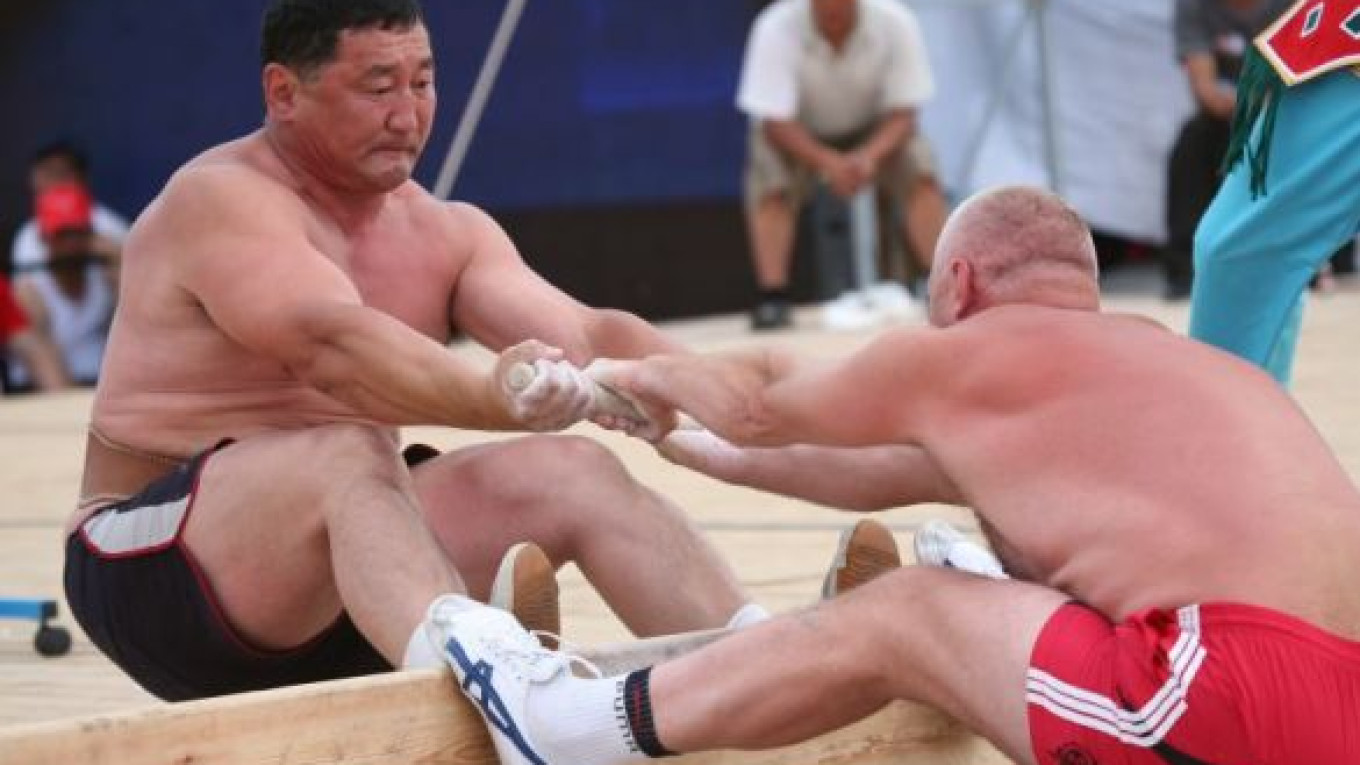YAKUTSK — Athletes from around the world will be trying to outdo one another at "stick-pulling" in the Olympics one day if Russia gets its way.
The sport, also known as mas-wrestling, is among unique homegrown sports that the republic of Sakha is pushing on powerful international platforms in a bid to catch the world's attention.
Two traditional sports, mas-wrestling and khapsagai, have enjoyed particular success, even being recognized by the International Federation of Associated Wrestling Styles, a member of the International Olympic Committee.
Mas-wrestling is exactly what it sounds like (mas is the Yakut word for stick). Two opponents sit facing each other with their feet extended and braced on a wooden board and pull on a thick wooden bar made from birch in an attempt to wrest it from the hands of the opponent.
The sport requires thick and powerful muscles in the back and forearm, but a degree of technique must also be applied to successfully overcome the opponent.
Khapsagai is a more familiar sport, similar to Greco-Roman wrestling. But in khapsagai, the objective is to force the opponent to touch the mat with any part of the body except the feet.
For example, if a wrestler's knee, hand or elbow touches the mat, the match is over.
The Russian government is a strong supporter of the republic's traditional sports and recognizes them in a federal roster of sports, a key step to facilitate their spread outside the region.
Moscow recently pumped nearly $100 million into the sports infrastructure of Yakutsk, the regional capital of less than 300,000, where the traditional sports of the Yakut people have steadily gained popularity.
Sports Minister Vitaly Mutko even chose the city to host the annual Russia Is a Sports Power forum, to which he flew in early July.
As part of the forum, Mutko and Sakha leader Yegor Borisov opened a $5 million addition to the republic's Manchaary Traditional Sports Center, underscoring the federal support.
"These are not just sports but a part of the culture of a people. They are interesting and popular and are undergoing a revival," Mutko said at the plenary session of the forum. "The inclusion of special programs and support at the federal level is necessary, so we will support them."
Both mas-wrestling and khapsagai are gaining an international profile, and the first championships for both were held in Asia and Europe in 2011. The first world championship for mas-wrestling was held in Yakutsk this month.
The republic of Sakha is also seeking to cultivate an interest in its traditional sports among younger athletes, holding competitions as part of its Olympic-style Children of Asia games, held every four years with more than 3,000 children from 28 countries.
The event was organized in partnership with the International Olympic Committee and UNESCO.
The children's games have helped khapsagai gain footing abroad, prompting the Azerbaijan team to host an international competition for the sport in its own country.
Sakha's leader said he hoped traditional sports would eventually become part of the Olympic Games.
But mas-wrestling and khapsagai still have a long way to go. To even be considered as Olympic sports, they must meet strict standards set by the IOC.
These include worldwide recognition, an international governing body and adherence to the official Olympic Charter.
Mutko said traditional sports have trouble getting an international audience because "when you are the best at something, nobody wants to play against you."
But traditional sports, which are unknown even to many Russians, give the impression that they are still highly underdeveloped.
The winner of the world championship in mas-wrestling — attended only by nine other countries — said he trains just "twice a week if it works out. Sometimes once."
World champion Viktor Kolibabchuk, of Smolensk, is a former basketball player who, at more than 2 meters tall and 144 kilograms, would be a formidable opponent in any sport.
He matter-of-factly explained how he started to participate in the sport and rose to win the championship: "I tried it, we started to practice, we kept working, then we went to the tournament."
Although Kolibabchuk is not from the republic of Sakha, it still remains the most important base for these traditional sports.
Innokenty Grigoryev, director of the Manchaary Traditional Sports Center, said the sports remain popular because they fit the traditions, lifestyle and even genetics of those who call the republic home.
"Every sport arises according to those physical and genetic attributes unique to the region, and these sports are more accessible to us" he said.
But he doesn't discount the future Olympic potential of traditional sports.
"A soldier who doesn't dream of becoming a general is a bad soldier," he said. "We think that one day we'll make it to the Olympics."
Current mas-wrestling world champion Victor Kolibabchuk grapples for control in a 2010 Russia championship match.
A Message from The Moscow Times:
Dear readers,
We are facing unprecedented challenges. Russia's Prosecutor General's Office has designated The Moscow Times as an "undesirable" organization, criminalizing our work and putting our staff at risk of prosecution. This follows our earlier unjust labeling as a "foreign agent."
These actions are direct attempts to silence independent journalism in Russia. The authorities claim our work "discredits the decisions of the Russian leadership." We see things differently: we strive to provide accurate, unbiased reporting on Russia.
We, the journalists of The Moscow Times, refuse to be silenced. But to continue our work, we need your help.
Your support, no matter how small, makes a world of difference. If you can, please support us monthly starting from just $2. It's quick to set up, and every contribution makes a significant impact.
By supporting The Moscow Times, you're defending open, independent journalism in the face of repression. Thank you for standing with us.
Remind me later.


